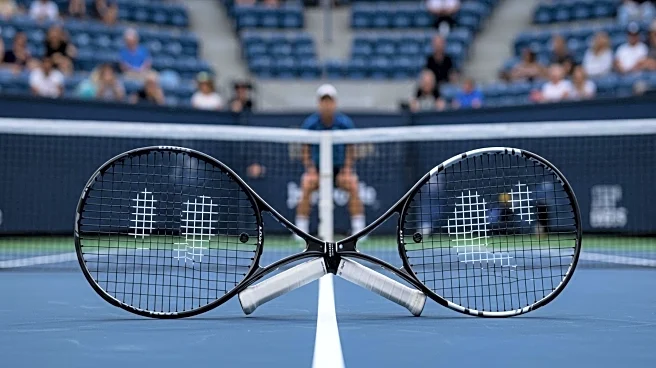What's Happening?
Carlos Alcaraz and Emma Raducanu, both former U.S. Open singles champions, were eliminated in the first round of the newly formatted U.S. Open mixed doubles event. They lost to the top-seeded team of Jack Draper and Jessica Pegula with scores of 4-2, 4-2. The event has faced criticism for prioritizing singles stars over traditional doubles teams, reducing the field from 32 to 16 teams. Half of the teams were selected based on singles rankings, while the rest were chosen by the U.S. Tennis Association. The prize money for the winners has increased to $1 million, up from $200,000 last year. The tournament format was altered to include sets played to four games and a two-day schedule before the singles events.
Why It's Important?
The changes to the U.S. Open mixed doubles format have sparked debate within the tennis community. Critics argue that the new format undermines the integrity of doubles play by excluding specialized doubles teams. This shift could impact the future of doubles events, potentially reducing opportunities for doubles specialists and altering the competitive landscape. The increased prize money and focus on singles stars may attract more attention to the event, but it raises questions about the fairness and authenticity of the competition. The controversy highlights broader issues in sports management, where commercial interests may conflict with traditional sporting values.
What's Next?
The mixed doubles tournament will conclude on Wednesday, with the singles draw set to begin on Sunday. The ongoing criticism may prompt discussions among tennis officials and stakeholders about the future format of mixed doubles events. Players and fans may advocate for a return to traditional formats that prioritize doubles specialists. The U.S. Tennis Association may need to address these concerns to maintain the credibility and appeal of the tournament.
Beyond the Headlines
The format change in the U.S. Open mixed doubles event reflects a broader trend in sports where commercial interests can overshadow traditional practices. This situation raises ethical questions about the balance between entertainment value and sporting integrity. The decision to prioritize singles stars may be seen as a move to increase viewership and revenue, but it risks alienating dedicated doubles players and fans who value the purity of the sport. The controversy could lead to a reevaluation of how sports events are structured and marketed.










